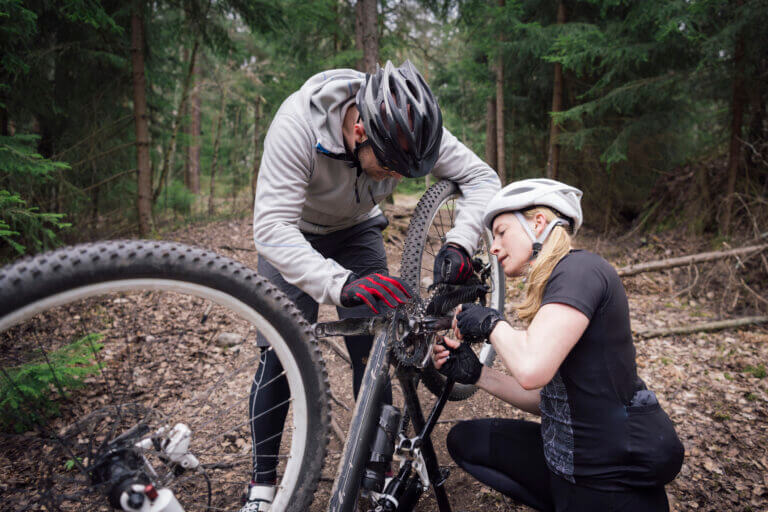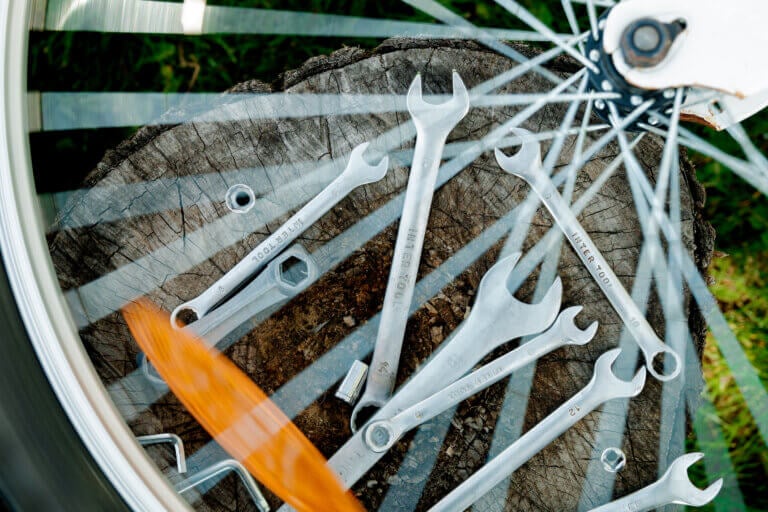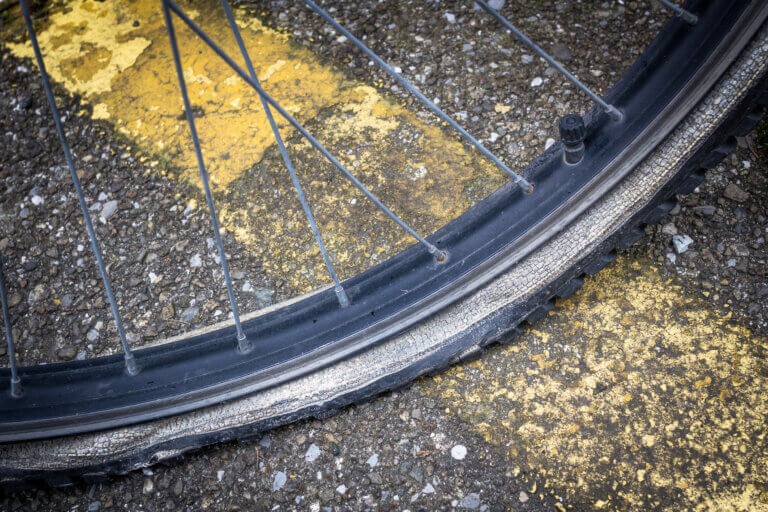A flat bicycle tire can totally mess up your ride. Here are some quick tips on how to get it patched or replaced fast.

Popped tires, flat tires, punctured tires — they’re a pain to fix, especially if you’re in a rush or in the middle of nowhere. If you’ve got a flat bicycle tire, here’s how to fix it and get back to safety quickly.
What’s in this article?
Step 1: Know what kind of tires your bicycle has
Most bicycles have tires with tubes, or without them. How you fix a flat bicycle tire, and the tools you need, depend on the type you have.
If you don’t know what kind of tires your bicycle has, check your:
- Owner’s manual
- Local bicycle shop
- Online bicycle community boards
- Bicycle manufacturer’s website
If you aren’t sure, here’s a quick rule of thumb: if you have a mountain bike, it’s probably tubeless. If you have a road bike, it might be tubeless.
Step 2: Choose your flat bicycle tire repair tools
It’s smart to keep these tools in handy because a popped tire is nearly always a surprise.
If you have tubed tires, you’ll need the following equipment prepped ahead of time.
- Tire levers
- A spare tube
- Patch kits or plugs
- Mini pump and/or CO2 cartridges
On the other hand, if you have tubeless tires, you’ll need everything listed below.
- Tire levers
- Tire plugs
- Mini pump and/or CO2 cartridges
- Sealant

Step 3: Remove the flat tire/wheel
If your bicycle doesn’t have a tube or if the pop isn’t too bad, you might get lucky — in which case, move to the next step.
If your flat tire has a tube or the damage is bad, you’re going to have to remove the tire completely.
Stand opposite your bicycle chain and flip the bike so the tires are up in the air. Keep in mind that you might have to loosen up the brakes or shift your drivetrain for this, depending on what kind of bicycle you have. You might also need your tire levers for this.
Step 4: Locate the flat bicycle tire’s puncture
This can be tricky, especially if you’re running out of daylight — but you’ll need to find exactly where the hole is to plug it.
Sometimes it’s obvious and there’s a branch stuck in the tire, other times it could be a small rock or piece of glass. Take care not to cut yourself as you find what popped the tire or check to make sure nothing is there anymore.
Keep in mind that you might not be looking for a hole, either. It could be a pinched tire or another type of puncture that caused the flat.
Step 5: Patch the flat bicycle tire or replace it
Once you’ve assessed the damage, it’s time to patch it or replace it.
When to patch a flat bicycle tire:
- If you have a tubeless tire
- If the tire isn’t too badly damaged
- If you don’t have a replacement tube
When to replace a flat bicycle tire:
- If you have a tubed tire
- AND you also have a spare tube
If you’re patching, clean the area and double-check it’s free of any leftover debris. Then follow the directions on your patch kit if there any.
If you don’t have any directions with you, you’ll likely need to apply the patch with sealant or glue and hold it for a few seconds.
If you’re replacing the tube, inflate the new one and slide it into the empty tire. Try to work it in carefully and tuck both sides of the tube in when you’re done.

Step 6: Put the bicycle tire back on
Once you’ve patched or replaced the flat tube, get your wheel back on your bike. Again, you might have to adjust your brakes, drivetrain, or bicycle chain to do this.
Take extra caution as you put it back on not to re-puncture it. Once you’ve replaced the tire, slowly ride it around to make sure everything feels right.
Extra bicycle flat tire tips
- Inflate the tire with your pump to help locate the puncture
- To seat and reseat your tire, use a tire lever and pay attention to the bead(s)
- Check your quick-release lever or v-brake if the tire isn’t unseating easily
- Get used to using your flat tire repair tools when you aren’t in a pinch
- When you get a new bicycle, take the tire off and put it back on a few times before taking it out for the first time
More cycling resources
For even more helpful information, check out these links below. If you have any questions, drop us a line or reach out to us online — we’re always here and happy to help.
- The ultimate guide to bicycle insurance
- How to find your bicycle’s serial number
- The cyclist’s guide to bike warranties
- Everything you want to know about bicycle locks
- How to register your bicycle online
Want even more protection and peace of mind when you ride? We’ve got comprehensive bicycle insurance policies starting at just $100 a year. Build your own policy today!
